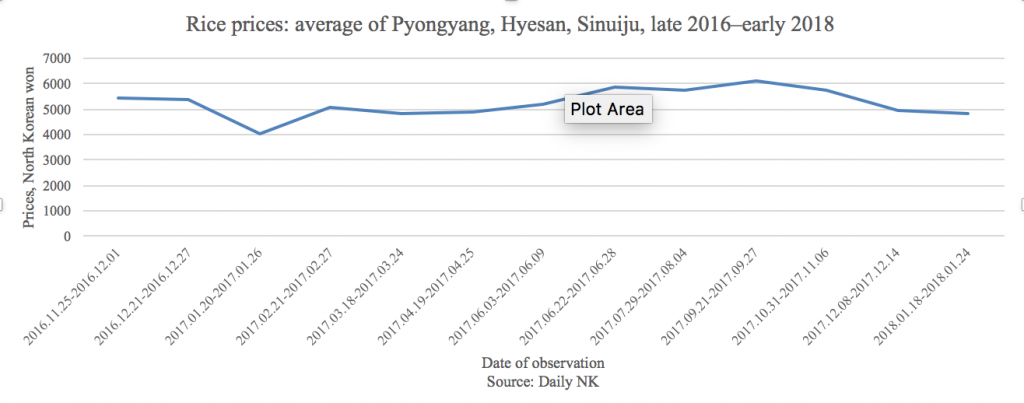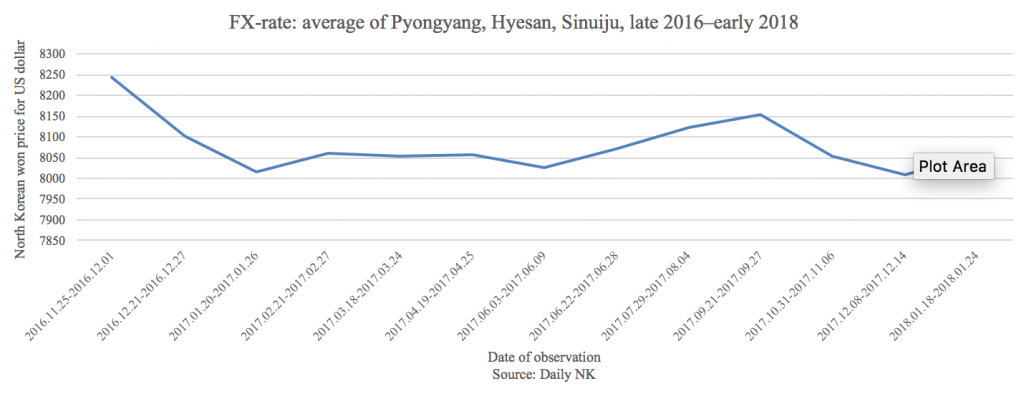UPDATE 1 (2018-4-4): The Donga Ilbo reports that China is marginally easing up on sanctions following the unofficial meeting that took place with the two country’s respective leaders. According to the article:
Some Chinese enterprises in Dandong, a city in northeastern Liaoning province bordering North Korea, stopped sending back North Korean workers to their home country, South Korea’s intelligence sources said on Monday.
…
It is reported that the Chinese authorities, however, have not taken any action regarding employing North Korean workers. Rather, a source quoted Chinese government officials as saying “refrain from any action that could upset North Korean people for the time being.”South Korean government said it is identifying intelligence that the average daily traffic volume between Dandong and North Korea surged to 50 trucks, from 20 to 30 trucks earlier this year. The traffic in this region is one of the key indicators that show bilateral trade flows. More than 100 trucks a day would come and go before the international community strengthened sanctions against the North.
According to data released by China’s customs agency, North Korean exports to China amounted to 1.72 billion dollars, a 33 percent down from 2016. However, Beijing is likely to give some breathing space to its ally as Chinese President Xi expressed his willingness to expand mutual exchanges in a meeting with Kim.
ORIGINAL POST (2018-3-30): I am still of the opinion that “maximum pressure” has not been the primary cause of North Korea’s newfound desire to hold talks with the US and South Korea. However, this article in the FT argues that China has enforced trade restrictions on North Korea in excess of the UNSC resolution requirements, and perhaps this policy played a role in bringing Kim Jong-un to Beijing.
According to the Financial Times:
Official Chinese statistics show that the monthly average of refined petroleum exports to North Korea in January and February was 175.2 tons, just 1.3 per cent of the monthly average of 13,552.6 tons shipped in the first half of 2017.
The level of reduction went far beyond the 89 per cent cut in petroleum product exports stipulated by the UN sanctions.
Chinese coal exports to North Korea were also cut to zero in the three months to the end of February, after running at a monthly average of 8,627 tons in the first half of 2017. Exports of steel ran at a monthly average of 257 tons in the first two months of this year, down from a monthly average of 15,110 tons in the first half of 2017.
Shipments of motor vehicles also dried up, with just one unit being exported in the month of February, official Chinese statistics show. Concerns over the accuracy of China’s statistics are common, but analysts said that such consistent and bold drops in export volumes are unlikely to have been the result of official massaging.
Bonnie Glaser points out a rumor that these stringent trade caps will be lifted to the point that China is still in compliance with UNSC resolutions.
After KJU visit to China, the sanctions China imposed on North Korea that go beyond U.N. sanctions will be lifted, according to one Chinese source. https://t.co/T7YvBfdS6L
— Bonnie Glaser / 葛来仪 (@BonnieGlaser) March 30, 2018


